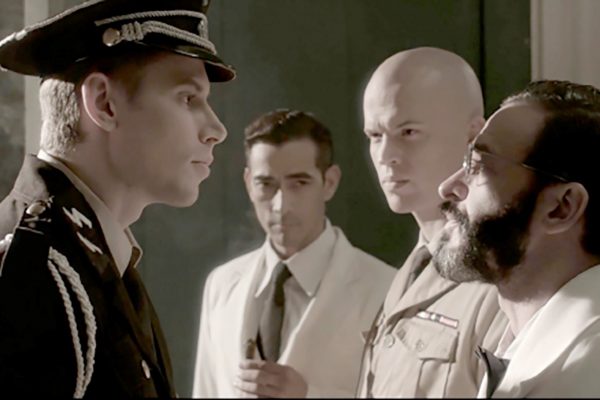The story of Manuel Quezon is little-told in this country. When we think of the Philippines our minds are drawn to the coverage of the corrupt Marcos regime. In his homeland however, Quezon is revered. He was the man who negotiated his country’s independence from the USA. Beyond that, he fought to open the doors of his country to Jews fleeing the Nazis prior to the outbreak of World War II. As the 75th anniversary of the liberation of Auschwitz once again asks us to consider the sheer horror of the Third Reich death machine, this is a story to be celebrated. However, a meagre budget and worthy-but-stolid execution ensure a production Croesus-rich in good intention, but lacking in cinematic merit.
In 1938 Quezon (Raymond Bagatsing) is petitioned by a Jewish-American friend to request that the annual quota of Visas granted by the governing USA be used to extricate Jews under threat from the rampant Nazi ideology. During a tortuous diplomatic process, he also suffers a relapse of the tuberculosis that would eventually kill him.
Quezon’s Game has been posited as a Filipino Schindler’s List, as the wily, charming president wades negotiates the safety of those at risk of being caught up in the coming Holocaust. However, it bears more resemblance to Steven Spielberg‘s other tale of attempted emancipation, Lincoln, in that the bulk of the narrative takes place in meeting rooms wreathed in cigar smoke as influential men batter out the morals, ethics and politics of the situation. Sadly, the flat televisual photography and relentless expositional dialogue mean that these scenes only ever hold the interest at a level of a History Channel documentary.
None of the blame can be laid at the feet of Raymond Bagatsing who brings a movie star twinkle to an otherwise controlled performance of quiet charisma. It’s easy to see how the charming Quezon was able to manoeuvre others to his cause. Bagatsing also manages to find layers to his character when the script is only just shy of hagiography. The closest we come to a depiction of a complex man are hints of an affair that surface early on and then are never mentioned again. It’s as if we’re getting a palimpsest glimpse of an earlier draft of the script; a rogue element that was never excised.
Made for a mere $500,000, Quezon’s Game may have benefited from a higher level of outside investment had it been less critical of the Philippines erstwhile governors. With the exception of a few of Quezon’s close allies, including the future president Dwight Eisenhower (a stoic, compassionate David Bianco) the Americans are depicted as being guilty of blocking Quezon’s plans, being massively anti-semitic, and actually more detrimental to Quezon’s goal than the Nazis. The Germans are more than happy to grant the necessary exit Visas on the grounds that, ‘Paper is cheaper than bullets.’ It’s both unusual and refreshing for any western occupier to be depicted as a net negative influence in this way, but one can’t help but feel it’s doomed the film to being not all it could be; although it’s a stance worth applauding.
It’s ultimately difficult to take against a film that is so laudable, but Quezon’s Game has the air of a passion project reaching beyond its means. Its historical value is certainly high, but it sadly falls short in too many other crucial areas.
In certain cinemas from Fri 31 Jan 2020
